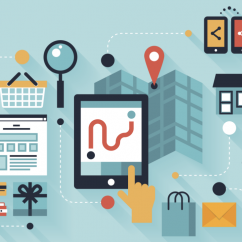Jewelry ECOMM Tech
Maximizing Sales Through Omnichannel Marketing | July 14, 2024 (0 comments)

What is Omnichannel Marketing?
Omnichannel marketing is a strategic approach that aims to provide customers with a seamless shopping experience, whether they are shopping online from a desktop or mobile device, by telephone, or in a brick-and-mortar store. This approach integrates various channels to ensure that customers have a consistent experience across all platforms. By leveraging data and technology, businesses can create personalized interactions that resonate with their audience, thus fostering loyalty and driving sales.
In essence, omnichannel marketing breaks down the silos between different sales and marketing channels. Instead of treating each channel as a separate entity, omnichannel marketing views them as interconnected parts of a holistic strategy. This interconnectedness allows businesses to gather more comprehensive data on customer behavior, which can be used to create more targeted and effective marketing campaigns. Additionally, it helps in aligning the brand message across all touchpoints, ensuring that customers receive the same information and quality of service no matter how they choose to interact with the brand.
Benefits of Omnichannel Marketing
Enhanced Customer Experience
One of the most significant benefits of omnichannel marketing is the enhanced customer experience it provides. By offering a consistent and personalized journey across all touchpoints, businesses can meet customer expectations more effectively. This consistency not only helps in building trust but also makes it easier for customers to make purchasing decisions, thereby increasing the likelihood of sales.
Moreover, an omnichannel approach allows for better customer service. For instance, if a customer has an issue with a product purchased online, they should be able to resolve the problem in-store seamlessly. This level of convenience can significantly boost customer satisfaction and loyalty. Furthermore, by utilizing data analytics, businesses can anticipate customer needs and preferences, offering proactive solutions and recommendations that enhance the overall shopping experience.
Increased Sales and Revenue
Another crucial advantage of omnichannel marketing is the potential for increased sales and revenue. By reaching customers through multiple channels, businesses can capture a broader audience and drive more conversions. Studies have shown that customers who engage with a brand through multiple channels tend to spend more than those who interact through a single channel.
Additionally, omnichannel marketing enables businesses to optimize their marketing strategies based on real-time data. This means that they can quickly identify which channels are performing best and allocate resources accordingly. The ability to adapt and refine marketing efforts on the fly can lead to more efficient use of marketing budgets and higher returns on investment. Furthermore, the personalized nature of omnichannel marketing can lead to higher customer retention rates, as satisfied customers are more likely to become repeat buyers.
Implementing an Omnichannel Strategy
Data Integration
The first step in implementing an omnichannel strategy is to integrate data from various sources. This includes online and offline sales data, customer service interactions, social media engagement, and more. By consolidating this data into a single system, businesses can gain a comprehensive view of their customers and identify patterns and trends that can inform their marketing efforts.
Effective data integration also involves ensuring that all team members have access to the same information. This can be achieved through the use of customer relationship management (CRM) systems or other centralized databases. By having a unified view of customer data, teams can collaborate more effectively and deliver a consistent experience across all channels. Furthermore, advanced analytics tools can help businesses to segment their audience more accurately and create highly targeted marketing campaigns.
Consistent Branding
Consistent branding is another critical component of a successful omnichannel strategy. This means that all marketing materials, whether online or offline, should reflect the same brand message, values, and visual identity. Consistency helps to build brand recognition and trust, making it easier for customers to connect with the brand.
To achieve consistent branding, businesses should develop clear brand guidelines that outline the use of logos, colors, fonts, and messaging. These guidelines should be shared with all team members and external partners to ensure that everyone is on the same page. Regular audits of marketing materials can also help to identify any inconsistencies and address them promptly. Additionally, businesses should consider the customer journey and ensure that each touchpoint reinforces the brand's core values and promises.
Technology and Tools
Leveraging the right technology and tools is essential for executing an effective omnichannel strategy. This includes marketing automation platforms, CRM systems, data analytics tools, and more. These technologies enable businesses to streamline their operations, personalize customer interactions, and measure the effectiveness of their marketing efforts.
Marketing automation platforms, for example, can help businesses to manage and execute campaigns across multiple channels more efficiently. These platforms can also provide valuable insights into customer behavior, allowing for more targeted and effective marketing efforts. CRM systems are another crucial tool, as they provide a centralized repository for customer data, enabling businesses to deliver personalized experiences at scale. Finally, data analytics tools can help businesses to measure the impact of their omnichannel efforts and make data-driven decisions that drive continuous improvement.
Conclusion
In today's jewelry marketplace, adopting an omnichannel marketing strategy is no longer optional but essential. By providing a seamless and consistent experience across all channels, businesses can enhance customer satisfaction, drive sales, and build long-term loyalty. While implementing an omnichannel strategy requires investment in technology and data integration, the benefits far outweigh the costs. Businesses that embrace this approach will be well-positioned to thrive in the digital age.
Ultimately, the key to successful omnichannel marketing lies in understanding the customer journey and delivering a cohesive experience at every touchpoint. By leveraging data, technology, and consistent branding, businesses can create a unified strategy that resonates with their audience and drives results. The future of marketing is omnichannel, and jewelers who invest in this approach will be the ones who succeed in the long run.
About The Author:
Mike Hauben is the Creative Director and Marketing Director for the Centurion Jewelry Show. He has over fifteen years experience and holds a number of digital certifications (Google, Yoast, Hubspot, and more). Mike has gained recognition among the jewelry industry in recent years as a popular keynote speaker, author, and trusted expert. He’s spoke at conferences like Centurion and JCK at the Javits Center.
He’s received an Award Of Excellence from MMA Business Magazine and is a black belt in Brazilian Jiu Jitsu. He lives with his family in Atlantic Beach, NY.
Learn more: haubenmedia.com


